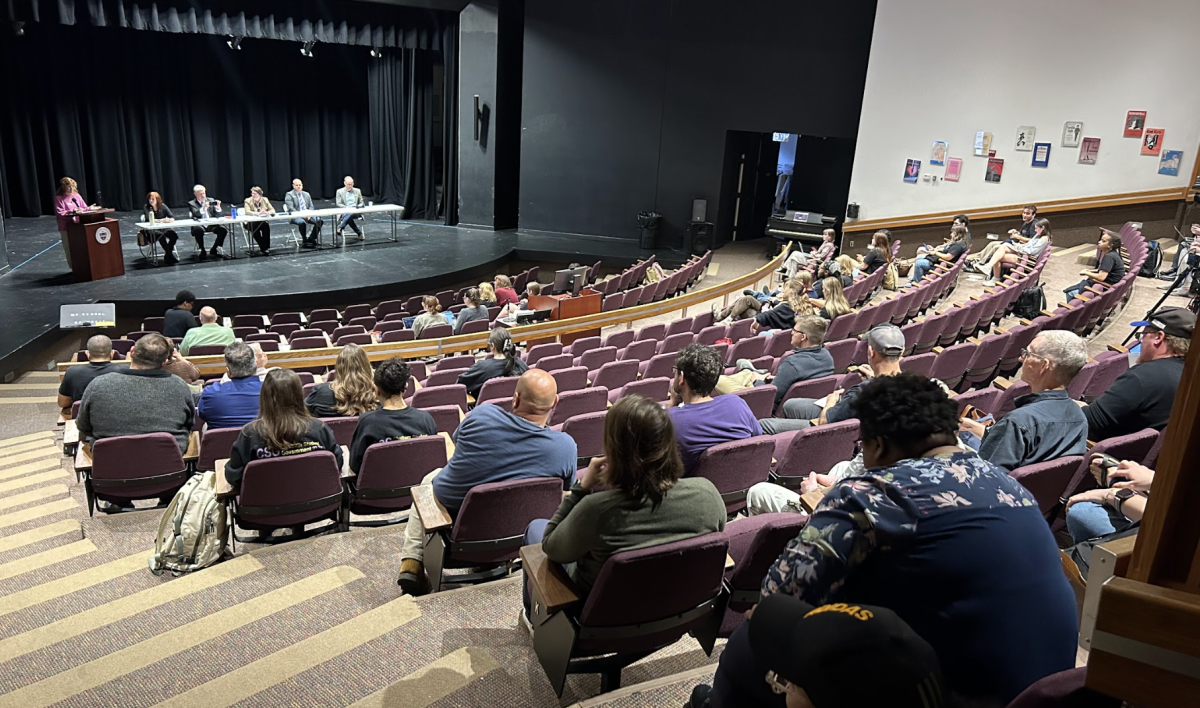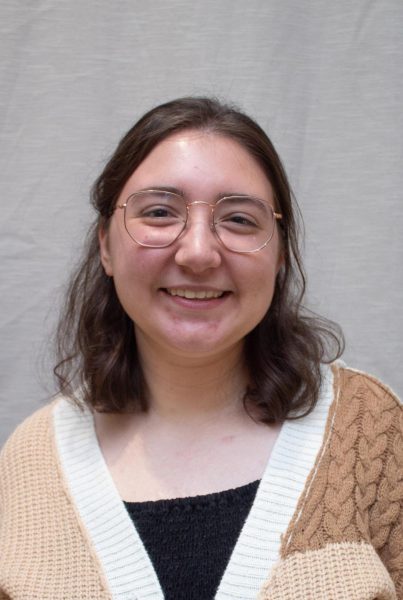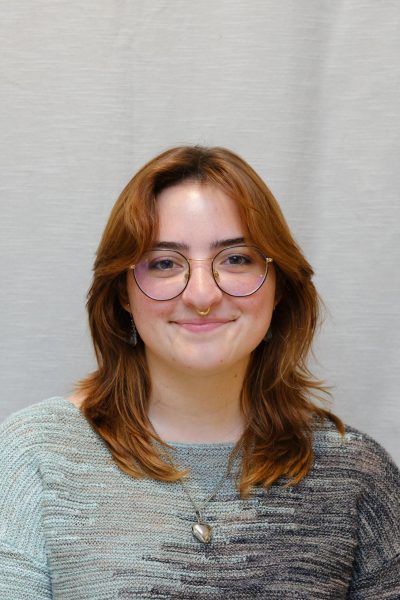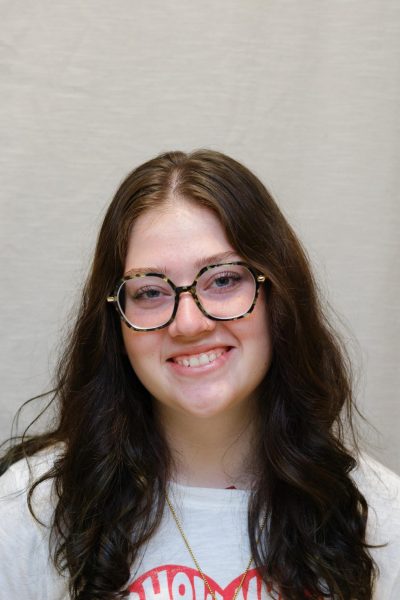Chatham Student Government held a town hall on Nov. 6, inviting students, faculty and staff to voice their concerns, compliments and questions to several key academic and administrative panelists, including University President Dr. Rhonda Phillips, Board of Trustees Chair Kent McElhattan, Falk School of Sustainability Dean Dr. Lou Leonard, Director of Academic Success Dr. Jeff Bukowski and Vice President of Academic Affairs & Provost Dr. Lisa Lambert.
The Communiqué talked to students after the event to learn more about their perspectives on two major topics from the event: the Board of Trustees and concern that athletics are being prioritized on campus.
Here are some key takeaways from and questions raised during the event:
Q: Is the Board of Trustees open to having a newsletter or more open channels of communication?
At town hall, Phillips provided general background on how the Board functions, stating that they meet three times: once in September or October, once in February and once in June. She discussed current channels of communication that the administration takes to communicate Board updates with students. Phillips said the administration strives to keep the Chatham community updated about the Board’s meetings and actions.
“We send a lot of emails, and then we’ve sent over like 90 emails since I’ve been here to the campus community,” she said. “Not everybody reads their emails, we know that for a fact. So we post things on the website, too. We also try to look for ways to inform our community, students, staff, faculty, alums and others.”
One Chatham student expressed not being familiar with the governing body. Julia Calvin ‘27 said, “I don’t know anything about the Board of Trustees.” Other students who were more aware of the Board’s existence expressed frustration over a lack of transparency.
“It does seem that they’re kind of this shadowy body that gets to decide a bunch of stuff regarding finances and administrative policy,” Rudy Bilger ‘28 said. “I think that there should be more of a connectivity between [the Board] and the student body, the faculty, the staff.”
Mary Stanton ‘27 shared similar concerns on the shrouded nature of the Board.
“From my understanding, they’ve been making efforts to be more transparent than in the past. But for the most part, there really can’t be transparency when nothing’s on an even playing ground,” Stanton said. “There’s no equal say for the professors or people who work on campus, and the students get no say or input on how decisions are being made.”
Q: Why has sports become a priority over preserving the history and women-centered legacy of Chatham?
As undergraduate admission rates have been increasing over the last few years, students have voiced concerns regarding where the priorities lay in an institution, claiming that it is seemingly putting more effort into athletics rather than academics and preserving the historic nature of Chatham.
“I’ll stand toe-to-toe with anyone who thinks that we need to go back to a model where we don’t have athletics,” Phillips said at the town hall.
Phillips emphasized that the University strives to maintain a balance between sports and academics, as well as the progress that athletic programs have made and the corresponding benefits they have brought to the University.
“Ten years ago, or even eight years ago, we had 80 student athletes,” Phillips said in response to the question. “Now we have over 22 teams, about 500 students, graduate and undergraduate, that come here to Chatham to play, and for academics. Those students tend to stay and graduate and retain very well here at Chatham. They are part of us. It is not us versus them. We are all Chatham, and we are all students and members of this community.”
Following the town hall, students voiced some uncertainties to the Communiqué surrounding Chatham’s commitment to non-athlete students.
“I think that when the liberal arts are starting to be neglected in a liberal arts institution, I think that you’d start to see a problem,” Bilger said.
Some Chatham student athletes hold different thoughts on the matter, viewing the athletic programs as beneficial to both students and Chatham’s community.
Aurielle Brunner ‘25 plays for both the Chatham women’s soccer and track team.
“The school is doing a good, good job at promoting women’s sports, and us adding men’s sports, too, is a good thing for campus and growing the campus community,” Brunner said.
Former women’s basketball player Caroline Murray ‘27 said that the experience of being on a college sports team is very distinct and different from existing outside of a team.
“As someone who played a sport last year and doesn’t anymore this year, last year I feel like, as I was on a team, I was strictly with my team, because I feel like you do everything together,” Murray explained. “You have a lot of the same classes, a lot of the same schedules. It’s just easier that way. But now this year, being outside of a sport, I feel like I broadened my horizons with multiple different types of people.
Q: Why not have an active student be on the Board of Trustees?
Later on in town hall, a Chatham community member asked about the potential for student representation on the Board.
“We are a non-profit, private entity. We have a governing board,” Phillips said. “We don’t typically have student reps on those organizations, on those Board of Trustees.”
McElhattan additionally noted that the primary goal of the Board of Trustees is to aid both the students and the institution.
“The Board’s responsibility is to serve the customer. In this case, it’s the student, and that is a lot. It’s not like the Board is going off on some retreat and figuring out how can we squeeze the institution or squeeze something out of students. It’s always how can we enrich students, to enrich the academic experience,” McElhattan said. “To me, [the decision to have students on the Board] just feels very odd.”
While the suggestion to have a student on the Board was generally dismissed, McElhattan also stated that he would be open to hearing more about a desire for a student presence at board meetings.
“We can continue talking about that, a student on board, but I’m genuinely just perplexed as to why you would want that and would be willing to listen to understand a better why,” he said.
Following the responses given at town hall, Stanton shared her thoughts on the difficulties of transparency even if a student presence were to exist.
“It honestly feels like they wouldn’t be able to say anything about what’s being talked about or discussed … because if there’s no there’s not a lot of communication about decisions being made or input. Even if one student was there, they wouldn’t be able to tell anyone on campus, because likely they’d be put in the same type of position as other members of the Board,” Stanton said. “It would definitely be helpful in some ways, but I feel like unless they change the process of how they go about it, it’s not going to really help much.”





